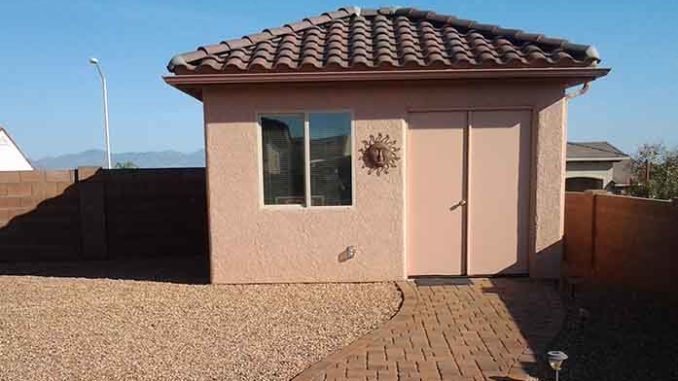
A Sierra Vista homeowner who paid for a land survey to prove a neighbor’s shed was built on his property can keep all his property for now, thanks to an Arizona Court of Appeals decision overturning a Cochise County judge who granted ownership of the disputed land to the neighbor.
The court of appeals ruled on Sept. 21 that a jury -and not a judge- should decide whether Gary Segal has to transfer about 440-square feet of his residential property to his neighbors, Stephen and Margaret Carstensen. The 3-0 appellate decision sends the case back to Judge Laura Cardinal “for further proceedings consistent with this decision.”
Court records show the dispute between neighbors dates back to July 2006 when Segal built a block wall between his lot and an adjacent vacant lot owned the Carstensens. The wall was narrowly set inside the property line, leaving about two percent of Segal’s half-acre lot on the back side of the wall.
Both parties claimed to have performed maintenance on the strip of land after the wall was built. Then in 2010, the Carstensens began to build their home, followed in 2011 by a shed / drainage structure.
Segal claims he complained to the Carstensens at the time that their shed encroached on his land. He also alleged the structure failed to comply with city of Sierra Vista’s zoning setback regulations, but a city inspector found no violations.
Then in 2018, Segal hired a land surveyor who confirmed part of the shed was in fact on his property. The Carstensens hired their own surveyor, who agreed with Segal’s surveyor.
Segal filed a civil action in Cochise County Superior Court in April 2018 seeking a court ordered quitclaim deed. The Carstensens countersued, arguing they were the ones entitled to a quitclaim deed under the legal doctrine of boundary-by-acquiescence and claiming adverse possession.
Acquiescence is a legal process by which a boundary line between two properties can be redetermined regardless of how the boundary is recorded in public plat records or deeds. The result can leave one property owner with less land and another with more, often without payment for the value of the property involved.
One of the Carstensens’ main arguments was they had used and cultivated the disputed area of Segal’s property for a period of more than 10 years, and were thus eligible to obtain legal rights to the land.
Cardinal agreed with the Carstensens and in October 2019 granted a motion for summary judgment in their favor. Segal immediately appealed, but it took until May 2020 before all legal filings and exhibits were ready for the court of appeals to consider.
On appeal, Segal argued that weed and debris control of his property on the back side of his wall by the Carstensens “did not equate to actual occupancy of possession of Segal’s property, because it was invisible, intermittent, and occasional.” He also argued that Cardinal ignored his testimony of putting his neighbors on notice of his claim when their shed was being built in 2011.
The court of appeals found that Cardinal’s grant of summary judgment was not appropriate because the Carstensens failed to show there was “no genuine dispute as to any material fact” or that they were entitled to judgment as a matter of law.
Instead, the appellate decision pointed out there were various questions of fact for a jury to decide, including whether the Carstensens “occupied” the disputed strip of land since 2006 even though they didn’t build their home until 2010.
The Carstensens have until Oct. 22 to petition for review by the Arizona Supreme Court. Otherwise that is the date the appellate decision becomes official and the case returned superior court for Cardinal to schedule a post-appeal hearing to move the case forward to a trial in 2021.
Segal was represented throughout the lower court case and the appeal by Chris Russell, an attorney based in Sierra Vista. The Carstensens were represented by Debra Boyer of the Udall Law Firm in Tucson.
